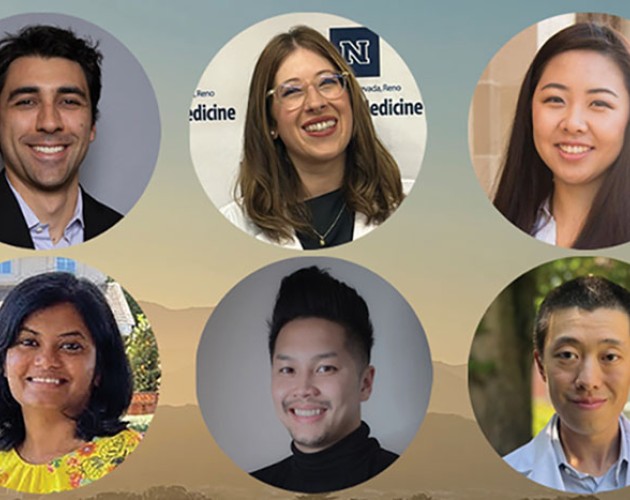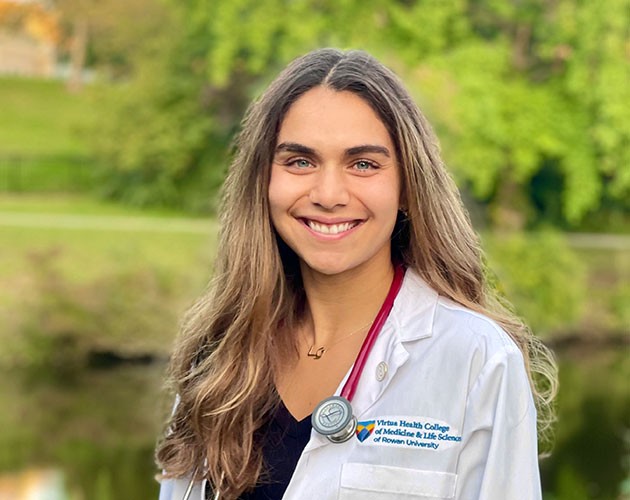You Can Be in Two Places at Once in Health Care

Current UC San Diego School of Medicine (Class of 2023) student Anita Satish has long held a goal: Be in a position where she can have one foot in the health care industry and one foot in the clinic.
And it began in 2010 with a gut decision to attend UC Berkeley as a premedical undergraduate student.
Growing up in the South Bay, when it came time to decide on a college, it was between UC Berkeley, UC San Diego and University of Southern California. She made a pros/cons list for each school, but when she visited the Berkeley campus, it “just felt like home.”
“There was an energy in the air that really resonated with me, and that outweighed everything on those pros/cons lists,” Anita remembers.
As for choosing her major, it was an AP psychology class in high school that piqued her interest. “When I got to college, I figured that as premed I could major in whatever I wanted and that psychology would complement my premedical classes nicely.”
Research Experiences for Real Life
“During undergrad, I still wasn’t sure what kind of research I was interested in,” Anita explains. “In January 2012, I joined a couple of labs with very different foci so I could explore more.
“I ended up at the Berkeley Social Interaction Laboratory under Dr. Dacher Keltner and at the Golden Bear Sleep and Mood Research Clinic (GBSMRC) under Dr. Allison Harvey. While I enjoyed working in both, I found myself gravitating more and more toward clinical psychology and started to take on more responsibilities at the GBSMRC.”
Those responsibilities were easily transferable from in-lab lessons to real-world duties.
“The most important lessons I learned were how to think critically and design a research question and how to run a research study from beginning to end,” she says. “Working on my honors thesis was also a lesson in professionalism—I had to learn how to communicate with incredibly busy individuals such as my principal investigator, set expectations, troubleshoot problems and come to the table with solutions.
“These research positions were also important because they helped me regain some of the confidence I had lost during a difficult academic period in my premedical classes. They call premedical classes ‘weeders’ for a reason! At the time I started research, I had decided to take a break from the premed path. This was hard to do because I had made ‘premed’ my identity for a long time. However, thriving in the research realm made me realize that I had other opportunities I could pursue.”
Anita’s growing interest in research also influenced her career trajectory. While working with Dr. Harvey and graduate student mentor, Jay Lee, on the development of a novel scale assessing the extent to which therapists utilize memory-promoting strategies in therapy, Anita became curious about the role technology could play.
“This subsequently inspired me to design and execute an independent honors thesis study that assessed the use of a simple text messaging intervention to improve memory for the contents of cognitive-behavioral therapy for depression,” she says.
“My honors thesis triggered my interest in digital health which led me to my first industry job, which in turn fostered that interest further and showed me what I could do with it.”
Post-Graduation Influences
After graduating from UC Berkeley in 2014, Anita accepted a position as a study coordinator at Stanford University while she decided whether to pursue a Ph.D. or an M.D. Because she had enjoyed her research experiences during her undergrad, pursuing a Ph.D. seemed like a natural next step.
However, the study coordinator position had its greatest influence on Anita by forcing her to reflect on why she was “solely focused on graduate education programs and not considering other possible career options.”
One of those other possible career options included what she could learn by working for a health care startup. Both Anita’s father and brother are CEOs of Bay Area-based startups, so the idea of working at one in health care—especially because she was still passionate about doing something in the field—became more compelling.
“That reflection led me to my first job at HealthTap, a virtual care startup based in Palo Alto,” she says.
“One of the most important things I got out of this job was incredible mentorship from Dr. Jay Wohlgemuth, who joined the company around the same time as me. Jay always encouraged me to bring my ideas to the table and pursue initiatives that I was interested in.”
Although Anita’s primary role at HealthTap was account management, she also dabbled in product, making feature suggestions to the product team based on feedback from the doctors with whom she worked. And the longer she worked there, Anita’s goal of medical school began to resurface.
“I felt that I could do more to impact the product if I were a doctor, with the knowledge and understanding of the clinical needs and gaps in care,” she recalls. “I also wanted to be more directly involved in patient care rather than just on the sideline helping other doctors do that.
“Jay as my mentor also set an example for the kind of role I wanted to play in the future and the kind of leader I aspired to be. This solidified my decision to return to school to complete my premedical coursework and eventually apply to medical school. I also ended up following Jay to my next job at Quest Diagnostics when I started my post-bacc. I can’t emphasize enough the importance of finding mentors who inspire you and are willing to invest in you. That kind of support and guidance really goes a long way in helping you aim high and reach your goals.”
Her Post-Bacc Health Course Experiences
In 2016, Anita began taking our Post-Bacc Health courses to fulfill some of her outstanding medical school prerequisites. Having already completed some science classes during her undergrad at UC Berkeley, she focused on taking individual courses that she still needed or had an interest in.
“In the post-bacc, I took Physics I and Physics II with labs, General Biology I with lab, Biochemistry and General Chemistry II with lab,” she states.
As for her electives, Anita completed:
She also found that it wasn’t just what she was learning that made a difference in how well she did.
“I really enjoyed my classes with instructors Peter Niloufari, John Reville, Jeanette McCarthy and Keith Flower. All of them were very engaging teachers, and I felt like I learned the most in their classes and, importantly, enjoyed the learning process the most,” she commends.
As for relationships with fellow students, her experiences were profound.
“I did find a core group of friends (and carpool buddies from the South Bay) who have become some of my best friends,” Anita relates. “We were all on similar timelines, had similar goals and motivation, and really drove each other to be our best selves. And outside of this group of friends, I also had very cordial interactions with other peers in my classes.”
So by the time Anita completed our program in 2018, she was ready to apply to the medical school of her dreams.
“The Post-Baccalaureate Health Professions Program allowed me to finish the required classes I needed and boost my science GPA so that I would be a stronger candidate going into the application cycle,” she says.
Does Anita have any advice to impart to future students?
“One of the best parts of the Post-Bacc Health program is the flexibility of when and where you take classes and how many you take per semester,” she says.
“I would encourage students to be strategic about how they spend their time. I think there’s more value in taking a small course load and making more time for meaningful clinical, work and research experiences, than in focusing solely on school and finishing your courses as quickly as possible.
“While taking classes at UC Berkeley Extension, I was able to concurrently work as a medical scribe at a Bay Area community clinic and as a program manager in employee health at Quest Diagnostics. Both were incredibly meaningful experiences where I learned a lot and had a lot to talk about on my applications and in interviews.”
On to Medical School
Anita is now a third-year medical student at UC San Diego School of Medicine, currently on her psychiatry rotation.
“While there’s really no education that can prepare one for the firehose of information that is presented during medical school, I will say that I felt more equipped to handle the challenges and stress of medical school because I was already used to a full plate between my jobs and taking classes at Extension,” she says.
And she has that career goal of being involved in the medical industry and being hands-on with health care in clear view.
“I love the idea of being able to see patients directly while also taking a 10,000-foot view and affecting change at a population scale.
“I’m not sure yet what field I want to specialize in. My current interests have me leaning toward psychiatry or internal medicine, but I’m treating every rotation as if it could be my future specialty. I’m very excited to have my pre-clinical years behind me and to get involved with patient care now. After all, that is what I came here to do!”


